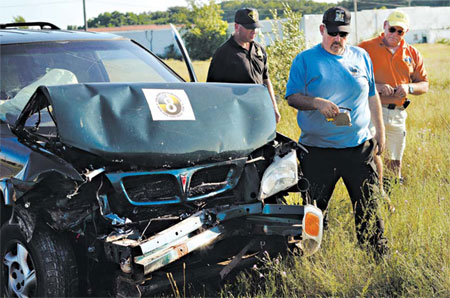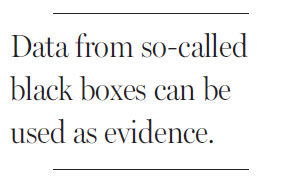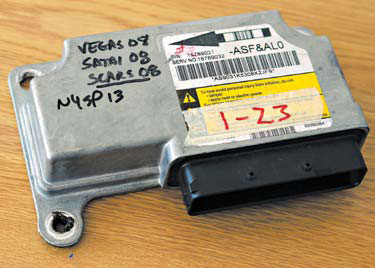Car recorders raise issues of privacy
Updated: 2013-09-22 07:56
By Jaclyn Trop(The New York Times)
|
|||||||||

|
A recorder being removed after a test crash in Romulus, New York. In much of the United States, the police can access the information. Photographs by Heather Ainsworth for The New York Times |

About 96 percent of all new vehicles sold in the United States have so-called black boxes, recorders long used by car companies to assess vehicle performance.
But the trove of data inside the boxes has raised privacy concerns, including questions about who owns the information and how it can be used.
The recorders "provide critical safety information that might not otherwise be available" to the National Highway Traffic Safety Administration "to evaluate what happened during a crash - and what future steps could be taken to save lives and prevent injuries," David L. Strickland, the safety agency's administrator, said.
Consumer advocates say the data can be used against car owners, to find fault in accidents or in criminal investigations.
"These cars are equipped with computers that collect massive amounts of data," said Khaliah Barnes of the Electronic Privacy Information Center, a Washington-based consumer group. "Without protections, it can lead to all kinds of abuse."
In the United States, where the boxes will be installed in every new car by September 2014, their presence must be disclosed in the owner's manual. But most drivers do not know that their vehicle can capture and record their speed, brake position, seat belt use and other data each time they get behind the wheel.
Unlike the black boxes on airplanes, which continually record data including audio and system performance, the cars' recorders capture only the few seconds surrounding a crash or air bag deployment. A separate device extracts the data, which is analyzed through computer software.
The Alliance of Automobile Manufacturers, a Washington-based trade association that represents 12 automakers including General Motors and Chrysler, said it supported the mandate because the recorders helped to monitor passenger safety.
"Event data recorders help our engineers and researchers understand how cars perform in the real world, and one of our priorities for E.D.R.'s continues to be preserving consumer privacy," said Wade Newton, a spokesman for the trade association.
Critics also question the data's reliability.
"It's data that has not been shown to be absolutely reliable," said Daniel T. Ryan, a lawyer who successfully argued the point in a case following a 2009 accident. "It's not black and white."
Black boxes, which are the size of two decks of cards and are situated under the center console, date to the 1990 model year, when General Motors introduced them to conduct quality studies. Since then, their use and the scope of the data they collect has expanded.
The lack of standardization among manufacturers has made it difficult to extract the data, most notably during the investigations into the crashes caused by sudden, unintended acceleration in some Toyota vehicles.
Until recently, crash investigators needed an automaker's proprietary reader as well as the expertise to analyze the data. The safety administration's regulations will help enable universal access to the data by using a commercially available tool. At the same time, police departments are receiving training on the new regulations.
Privacy advocates have expressed concern that the data collected will only grow to include a wider time frame and elements like GPS information.
Thomas Kowalick, an expert in event data recorders and a former co-chairman of the federal committee that set the standard for black boxes, said, "The rabbit hole goes very deep when talking about this stuff."
The New York Times
(China Daily 09/22/2013 page11)
